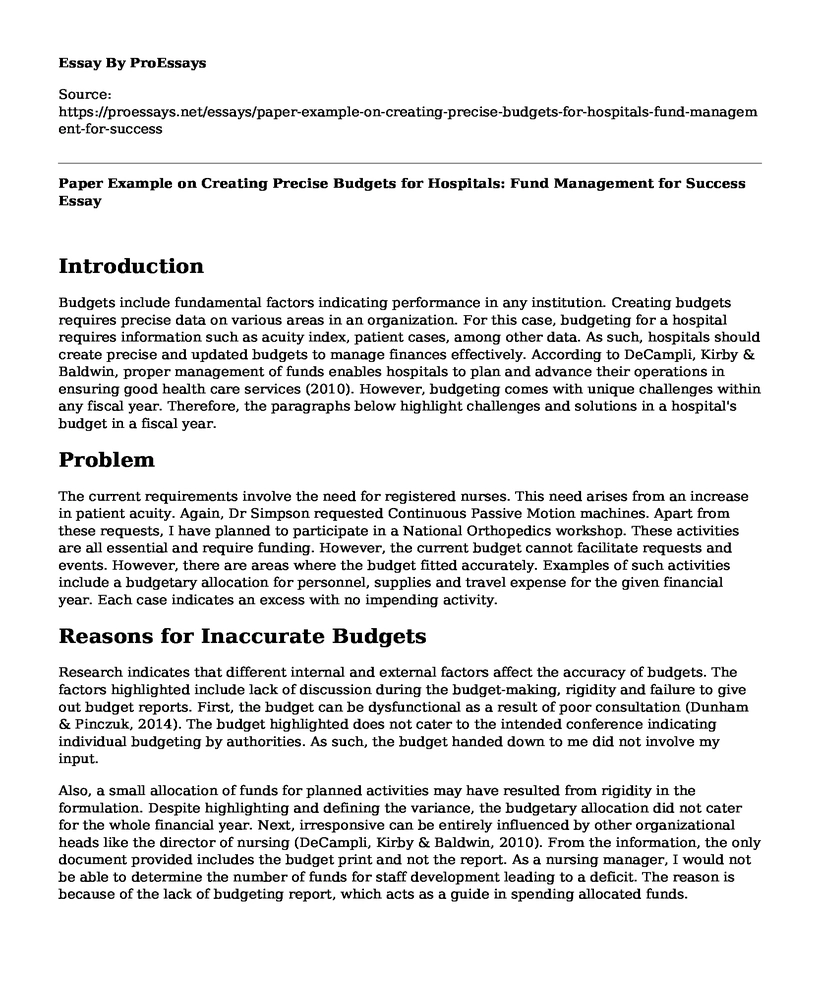Introduction
Budgets include fundamental factors indicating performance in any institution. Creating budgets requires precise data on various areas in an organization. For this case, budgeting for a hospital requires information such as acuity index, patient cases, among other data. As such, hospitals should create precise and updated budgets to manage finances effectively. According to DeCampli, Kirby & Baldwin, proper management of funds enables hospitals to plan and advance their operations in ensuring good health care services (2010). However, budgeting comes with unique challenges within any fiscal year. Therefore, the paragraphs below highlight challenges and solutions in a hospital's budget in a fiscal year.
Problem
The current requirements involve the need for registered nurses. This need arises from an increase in patient acuity. Again, Dr Simpson requested Continuous Passive Motion machines. Apart from these requests, I have planned to participate in a National Orthopedics workshop. These activities are all essential and require funding. However, the current budget cannot facilitate requests and events. However, there are areas where the budget fitted accurately. Examples of such activities include a budgetary allocation for personnel, supplies and travel expense for the given financial year. Each case indicates an excess with no impending activity.
Reasons for Inaccurate Budgets
Research indicates that different internal and external factors affect the accuracy of budgets. The factors highlighted include lack of discussion during the budget-making, rigidity and failure to give out budget reports. First, the budget can be dysfunctional as a result of poor consultation (Dunham & Pinczuk, 2014). The budget highlighted does not cater to the intended conference indicating individual budgeting by authorities. As such, the budget handed down to me did not involve my input.
Also, a small allocation of funds for planned activities may have resulted from rigidity in the formulation. Despite highlighting and defining the variance, the budgetary allocation did not cater for the whole financial year. Next, irresponsive can be entirely influenced by other organizational heads like the director of nursing (DeCampli, Kirby & Baldwin, 2010). From the information, the only document provided includes the budget print and not the report. As a nursing manager, I would not be able to determine the number of funds for staff development leading to a deficit. The reason is because of the lack of budgeting report, which acts as a guide in spending allocated funds.
Solutions
Referring to the current situation, I would tackle each issue independently. The first consideration includes employing registered nurses since the budget favors this action. This action falls within the budgetary allocation for personnel. However, the main challenge includes Dr. Simpson's request and registration for the National Orthopedics Conference. As such, the main concern involves the capacity to fund these activities. Each allocation indicates a deficit. Because of Dunham and Pinczuk's thoughts, I would consult with the finance on the benefits of funding these sections in the budget and finally present the case to the board of directors (2014). As a defence to my proposal, I would highlight the benefits of making these changes based on the hospital data, which records the high number of patients with orthopedic conditions. However, I would consider forwarding the expenses for the conference to the next financial year because the conference starts in August.
Recommendations
Making budgets involves various departments within a hospital. Therefore, this process requires consultation with different departmental heads. As such, I would recommend considerations by all members through their various leaders. Again, I would encourage flexible budgets that enable swift operations that positively favor the hospital.
References
DeCampli, P., Kirby, K. K., & Baldwin, C. (2010). Beyond the classroom to coaching: Preparing new nurse managers. Critical Care Nursing Quarterly, 33(2), 132-137. DOI : 10.1097/CNQ.0b013e3181d913db
Dunham-Taylor, J., & Pinczuk, J. Z. (2014). Financial management for nurse managers. Jones & Bartlett Publishers. ISBN :978-1-284-03103-4
Cite this page
Paper Example on Creating Precise Budgets for Hospitals: Fund Management for Success. (2023, May 08). Retrieved from https://proessays.net/essays/paper-example-on-creating-precise-budgets-for-hospitals-fund-management-for-success
If you are the original author of this essay and no longer wish to have it published on the ProEssays website, please click below to request its removal:
- Prophylactic Mastectomy Versus Preventive Drugs for BRCA1 and BRAC2 Gene Mutation Carriers Investigative Report
- Paper Example on Therapeutic Recreation and Auditory Disability
- Politics of Aids Policy Growth in South Africa Essay
- Reasons Why Health Promotion, Community Health, and Prevention Are Important
- Essay Example on Anderson Hospital: Quality Acute Care in Illinois
- Essay on Sara: Pregnant Woman Alone With Two Kids - Mood Swings and Despair
- Essay Example on Tenants of Unit 248 Seeking Lower Rental Charges Due to COVID-19







